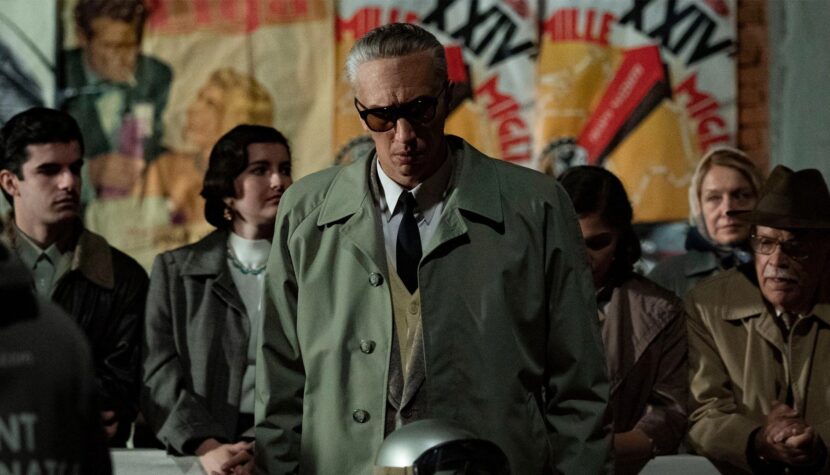FERRARI. Throne of Blood [Review]

Adam Driver as Enzo Ferrari manages his drivers like pawns on a chessboard, although when it comes to his private life, he loses after a few initial moves. It’s possible that one of the most talented actors of his generation offers one of the most ambivalent roles in his entire career. He’s uneven at times, but incredibly engaging throughout.
Right from the start, it’s worth noting that Michael Mann’s latest biographical film is best enjoyed without any prior knowledge of the main (anti?)hero’s history. This allows the viewer to fully experience the surprises and even suspense prepared for them – Mann doses out moments of tension from the beginning, ultimately leaving us with the feeling that something truly ominous could happen at any moment. However, those with some knowledge of Enzo Ferrari’s biography know that his Italian throne and the pseudonym “Commandante,” used not only by his closest associates but also by journalists, were to some extent paid for in blood. Unnecessary bloodshed, brought about in the ugliest ways, fueled by the fertile but risky ambition of the entire Ferrari team (from drivers to the boss himself). But how? Mann slowly deals the cards, not revealing certain events until the very end. Or, to put it differently, Mann doesn’t deal the cards but mechanically says “I check,” lays down five cards, and presents us with a poker game. One that captivates like Joe Frazier’s left hook.
Ferrari, despite being a automotive genius, made many mistakes in his life. Therefore, his wife, Laura (Penélope Cruz), becomes his counterpoint in the film. Full of temperament, her own opinions, and inner frustration, she tries to salvage a relationship that could still work if Ferrari had just a bit more willingness. Penélope Cruz occasionally overshoots in her reactions, but this doesn’t change the fact that the contrast between Cruz’s warmth and Driver’s coldness works intuitively and convincingly in intimate scenes where Laura and Enzo revisit their once fertile and sincere marriage.
Michael Mann is known for his ability to blend dynamic action with broader socio-cultural commentary. If Enzo Ferrari were not a historical figure who, through hard work, created one of the most prestigious brands in the world, we might feel that Ferrari (as interpreted by Driver) is a character plucked from other Mann films like “Heat” or “Collateral.” At times, he exudes class, and at others, he’s a rough-edged character; sometimes empathetic, and other times an unpleasant brute; sometimes a genius, and other times just a man who gets lost in life’s simplest matters (just like anyone else). Driver takes a dual approach to portraying the perpetually dissatisfied and irritated Ferrari, driven by his ambition. When he appears on screen and begins to put everyone in their place (including his wife and mistress), we believe he was psychologically fit to lead a company where he never backed down.
That’s why it’s only in the second half that Mann fully spreads his wings because he indulges in what he loves most: action and cinematic pace. When the racing sequences appear (even if only for a moment), we begin to understand that the director truly feels this atmosphere. We not only see his editing skills, which are an expression of a car enthusiast’s touch, but also the genius who not only sees and hears the film but also feels it. Ferrari largely presents itself as a profound drama, but it’s most satisfying when Mann showcases the most beautiful vehicles and lets the drivers break historical records anew.
With surgical precision, Mann approaches genre juggling in his latest film. This means offering us an eclectic narrative filled with both powerful scenes and dialogue filled with resentment spoken by the aggrieved Ferraris. This kind of narrative construction is somewhat symptomatic of Mann: for every scene that ramps up the film’s tempo (in this case, a certain race that forever etches itself into the history of the sport), we get two more talkative, much more intimate and nuanced sequences. This occasionally disrupts the dynamism, but it consistently evokes admiration: in a racing film, conversations, in some way, sustain the cinematic fireworks. Thus, “Ferrari” appears to be (perhaps unintentional?) juggling of both film editing and style. Two worlds collide here, resulting in a family drama with a significant dose of sports.
This is a film whose two halves of sensitivity meet at opposite ends. At times, we receive a detailed sequence of a racing accident, only to see Penélope Cruz swearing in her bittersweet role (more of the latter resonates here), oscillating between weltschmerz and brief moments when Ferrari’s wife remembers what love truly is (or used to be). Intimate cinema about genuine love destroyed by external factors, or a true sports film where the race and first place on the podium matter? Mann doesn’t provide a straightforward answer; based on Enzo’s biography, he simply offers his vision of events from decades ago.

